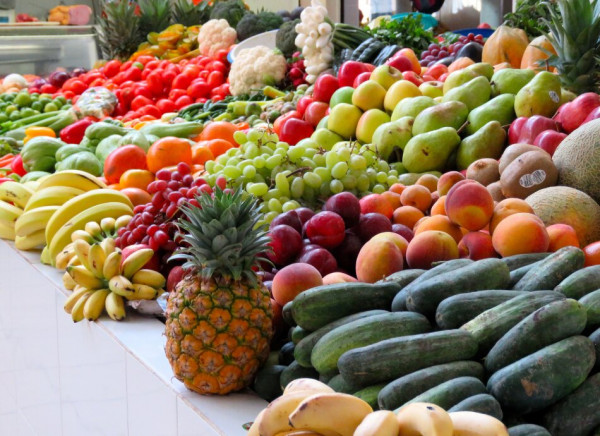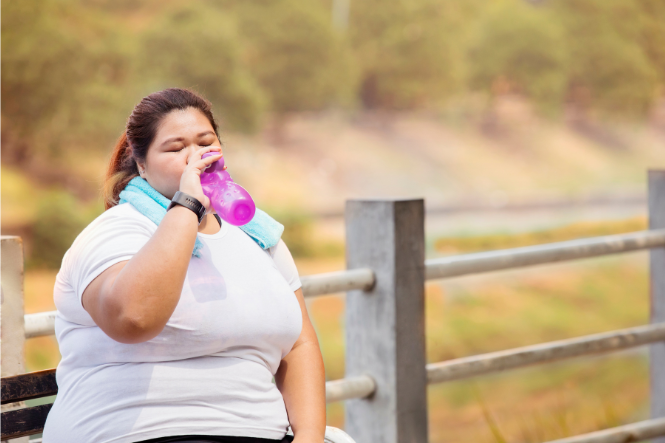Make healthy lifestyle choices
Maintaining a healthy lifestyle is one of the best ways to keep your kidney's healthy. For example, eat foods lower in salt and eat more fruits and vegetables. You should also aim for a healthy body weight, make physical activity part of your daily routine and quit smoking.

Image credit: Canva
Get your blood pressure checked
Having high blood pressure can damage blood vessels in your kidneys, reducing their ability to function properly. If the blood vessels in the kidneys are damaged, they may stop removing wastes and extra fluid from the body. Having extra fluid in your blood vessels may then raise your blood pressure even more, creating a dangerous cycle. Read more about high blood pressure.
Manage your diabetes
If you have diabetes, here are some steps you can take to reduce harm to your kidneys.
- Maintain your blood glucose targets as often as you can.
- Get tested for your average level of blood glucose over the past 3 months (HbA1c test). Get your test at least twice a year, but ideally up to 4 times a year.
- If your blood pressure is high, check it regularly and get it under control to make sure your kidneys stay healthy.
- Read more about diabetes.
Avoid dehydration
Dehydration is the loss of water and salts from your body. Drinking enough fluid every day is an important part of kidney health.
Video: Looking after your Kidneys (English)
The video below provides information on looking after your kidneys. This video may take a few moments to load.
(Kidney Health, NZ, 2015)
The video is also available in the following languages:
If you are unwell
If you are unwell with vomiting (being sick), diarrhoea (runny poos), or have a fever, you can lose extra fluid. It's important to keep yourself hydrated by having small sips of water every few minutes.
| If you are unwell and unable to drink fluids properly, or you notice that you're passing less urine (pee) than usual, contact your doctor immediately. |
In hot weather
In hot weather, always drink plenty of fluids during the day, especially when working or exercising in the sun. Where possible, try to schedule all physical outdoor activities for cooler parts of the day. Drink water before, during if possible, and after you play sport to ensure your body stays hydrated. Read more about preventing dehydration.
Manage your medicines
Have a sick day plan
Taking some medicines (see table below for examples) increases your risk of getting acute kidney injury, especially if you take these medicines while you are dehydrated, or you take a combination of these medicines. If you are unwell and are unable to drink fluids properly, have a sick day plan. You may need to miss doses until you feel better. Check with your doctor and pharmacist whether the medicines you are taking put you at risk of AKI and about having a sick day plan(external link).
| Examples of medicines that increase your risk of AKI |
|
|
|
| The list above is not complete. Ask your doctor or pharmacist about the medicines you are taking. |
Be careful when taking some pain relief medicines
Taking the group of pain relief medicines called ‘non steroidal anti inflammatory drugs’ (NSAIDs) can be harmful to your kidneys. Examples include ibuprofen, diclofenac and celecoxib. These medicines reduce the blood supply to your kidneys.
- If you're taking medicines for blood pressure or heart problems, eg, diuretics (water tablets), ACE inhibitors and ARBs (angiotensin II receptor blockers or sartans), don't use NSAIDs for pain relief. When taken together, these medicines are very harmful to your kidneys. Ask your doctor or pharmacist for other medicines for pain relief.
- Before buying NSAIDs for pain relief, check with your pharmacist whether these are safe for you. Read more about the risks of NSAIDs.
Are you taking an ACE inhibitor ('-pril') or ARB ('-sartan')?
ACE inhibitors or ARBs are used for a range of health problems including blood pressure and heart failure. These medicines are very important to help protect your kidneys from damage if you have diabetes. In most cases taking ACE inhibitors or ARBs are not only safe, but they are protective as well.
| Examples of ACE inhibitors |
Examples of ARBs |
- cilazapril (Zapril, Apo-Cilazapril)
- enalapril (Renitec M)
- lisinopril
- perindopril
- quinapril (Accupril®, Accuretic®)
|
- candesartan (Candestar®, Atacand®)
- losartan (Cozaar®)
|
However, if you are on ACE inhibitors or ARBs and take diuretics (water pills), the combination of these with NSAIDs (anti-inflammatory pain relief medication), can be very harmful to your kidneys. It can cause acute kidney injury. This combination is called the 'dangerous trio' or 'triple whammy'. You have a higher risk of harm to your kidneys if you are an older person or you're dehydrated.
If you're taking an ACE inhibitor or ARB, with a diuretic, do not use NSAIDs for pain relief. Ask your doctor or pharmacist for a safer option.
| Examples of diuretics |
Examples of NSAIDs |
- bendrofluazide (Arrow-Bendrofluazide)
- chlorthalidone (Hygroton)
- indapamide (Dapa-Tabs, Napamide)
- metolazone (Zaroxolyn)
- furosemide (Diurin)
|
- ibuprofen (Ibugesic, I-Profen, Nurofen)
- diclofenac (Voltaren)
- naproxen (Noflam, Naprosyn)
- mefenamic acid (Ponstan)
- celecoxib (Celebrex)
|
Be careful when taking multivitamins, food supplements and herbal or complementary medicines
Multivitamins, food supplements and herbal or complementary medicines may contain ingredients that are harmful to your kidneys. Always check with your pharmacist whether the medicines you are taking may interact with these.







